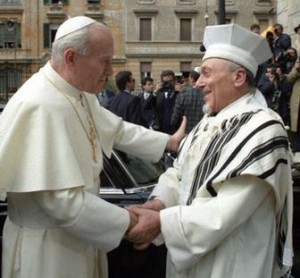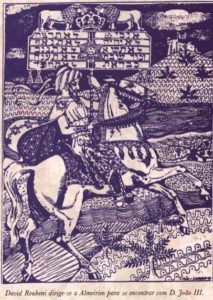“The Pope of the Jews”
Elio Toaff (1915-2015) was born in Livorno, Italy, the son of Livorno’s chief rabbi. Despite the fact that his father did not want his son to follow in his footsteps, Toaff nonetheless pursued religious studies (as well as law and theology at the University of Pisa) and was ordained a rabbi by age 24. At 26, he was appointed rabbi of Ancona. Not long after, Germany occupied northern Italy, and Toaff became a resistance fighter. Captured by the Nazis and sentenced to death, he managed to escape while digging his own grave. Following the war, Toaff became the rabbi of Venice, and a professor at its university. In 1951, he became the Chief Rabbi of Rome (and, in effect, the Chief Rabbi of Italy) a post he held for 51 years until retiring in 2002. He had the monumental task of restoring Italy’s Jewish communities after the massive destruction they experienced during the war. Rabbi Toaff focused his efforts on rebuilding Jewish infrastructure, reigniting Jewish education, and bridging the gaps between Jews and non-Jews. In 1986, he invited Pope John Paul II to Rome’s Great Synagogue for a joint prayer. The Pope accepted, marking the first time in history a pope visited and prayed at a synagogue. The two had a very close relationship. Incredibly, Rabbi Toaff was one of just two people that the Pope mentioned in his last will and testament (the other being the Pope’s personal secretary), writing “How can I fail to remember the rabbi of Rome?” Rabbi Toaff cleared the way for the Pope to visit Israel in 2000, and to establish formal diplomatic relations between the Jewish State and the Vatican. Rabbi Toaff was beloved by Jews and Catholics alike, and was a central voice of morality in Italy, as well as the primary authority in Jewish law. Toaff was knighted by the Italian Republic, and given the title of ‘Senator for Life’. He was commonly nicknamed “the Pope of the Jews”. Sadly, Toaff passed away on Sunday. He would have turned 100 years old next week.
Words of the Week
A rabbi doesn’t work only for his community or for the Jews. A rabbi has to talk to every human being who needs him. He belongs to everybody. He is for everybody.
– Rabbi Elio Toaff



